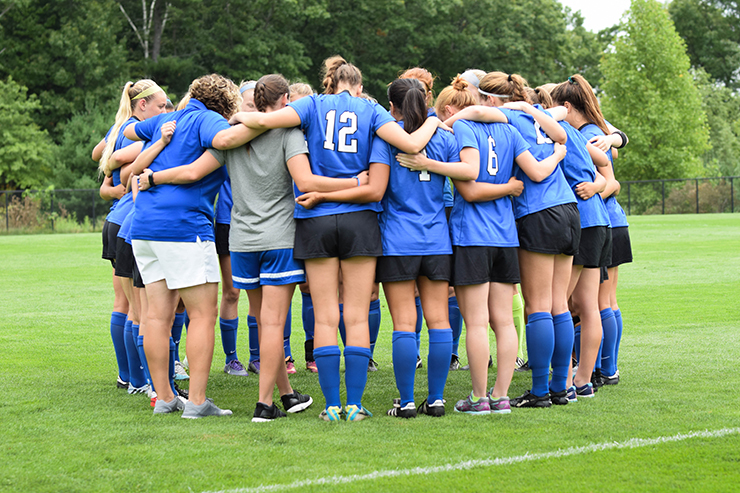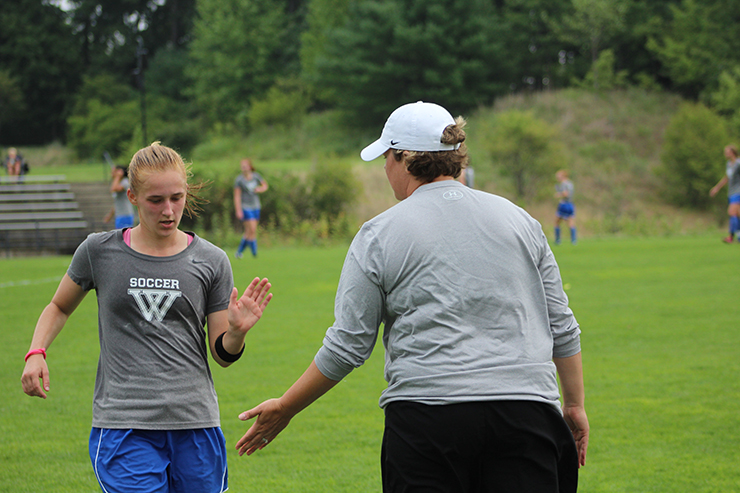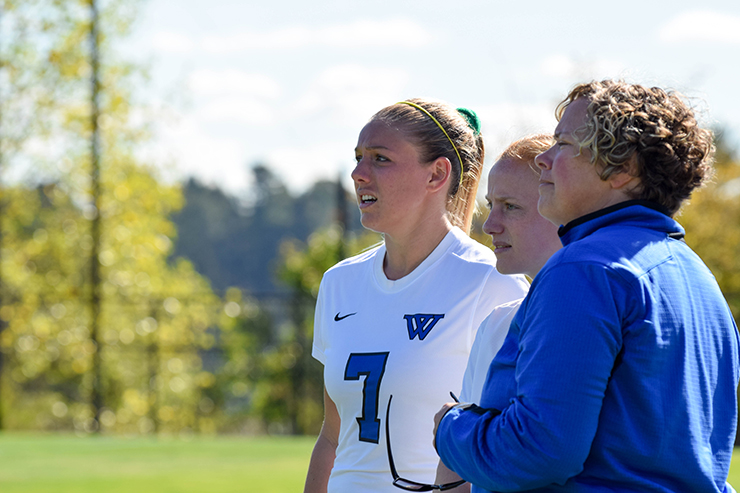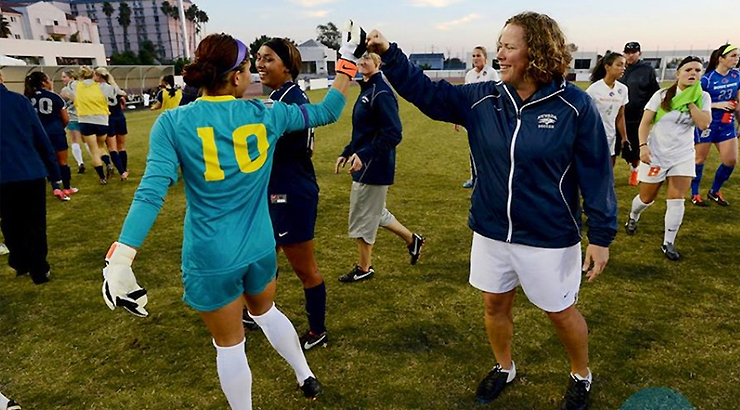Missy Price on Inspiring the Next Generation of Women In Soccer
Growing the Game of Soccer in the USA: The necessity for women to take leadership roles is a key factor in growing the game at all levels.
Missy Price is an example of a leader in soccer whose career reaches all aspects of the game. Currently serving as head coach of Women’s Soccer at Wellesley College, Price has continued to be a pioneer, paving the path from valued player to priceless coach.
Price received her Doctorate of Philosophy in Education in Sport Psychology from the University of Virginia and holds a NSCAA Premier Diploma as well as the U.S. Soccer Federation ‘A’ coach license.
Women In Soccer: Wellesley College women’s soccer head coach Melissa “Missy” Price is a force well recognized on the field — with a twenty-year career in the game, Price’s clear voice of leadership rings strong on the soccer pitch as well as in classroom.
Price joined Wellesley College in July, 2016 and also serves as PERA Assistant Professor of the Practice.  Price holds a Doctorate of Philosophy in Education in Sport Psychology, with a specialization in leadership and life skill development from the University of Virginia (UVA).
Price holds a Doctorate of Philosophy in Education in Sport Psychology, with a specialization in leadership and life skill development from the University of Virginia (UVA).
Prior to her appointment at Wellesley, she was the head women’s soccer coach at the University of Nevada for six seasons. While at UNR, she guided the Wolf Pack to the Mountain West Conference semifinals in 2012.
Price has also served as an assistant soccer coach and goalkeeper coach at the University of Miami, the University of Illinois and the University of Virginia. Price holds a National Soccer Coaches Association of America (NSCAA) Premier Diploma and a U.S. Soccer ‘A’ coaching license.

With a collegiate career as a goalkeeper at the University of Maryland from 1993-1997, Price lead the Terrapins to two NCAA quarterfinal appearances.
SoccerToday’s Diane Scavuzzo interviewed Price on women in soccer.
Diane Scavuzzo: What do you think is most challenging — working as a woman in soccer?
Missy Price: Looking around the field and seeing the number of female coaches declining is one of the greatest challenges and disappointments of my time.
I’m a product of Title IX — of the trailblazers who came before me, of the countless hours put in by the men and women pioneers in the women’s game.
I grew up reading mostly about men in Soccer America, playing on the Boys’ team in middle school, and watching men’s soccer on TV.
Women’s soccer just wasn’t part of the headlines back then. Without rehashing history, we all know that women’s soccer exploded in the media with the 1999 World Cup – by then I was in grad school and already coaching. Now, some 15+ years later, the landscape is different, but concerns remain about the women’s game.
We have a responsibility as coaches, both men and women, to foster the development of the next generation of female coaches to lead our girls.
Yes, it’s about coaching, but it’s greater than that – it’s about teaching girls to have a voice, to be confident, to be leaders. It’s about being role models & mentors of life skills – of the stuff we all know you can learn through sport.
Diane Scavuzzo: Why did you start coaching?
Missy Price: I started coaching when I was a college athlete – I liked the problem solving and teamwork aspects of coaching and they were smashed into one fun challenge – I was hooked.
Diane Scavuzzo: What inspires you?
Missy Price: I’m motivated by working with others, bouncing ideas around, solving problems, making our team and players better, figuring out ways to win, and fueling my curiosity.
I’m in the people business, that’s what coaching is to me.
I chose college soccer as my main environment, but I’ve spent time in the youth game as well. I’m a relationship builder and when I show up at a session, camp, coaching school, or to work every day with my college team; I’m there to interact, explore, and engage. Soccer is the vehicle, the proving ground, or the medium in which this all occurs.

To this day, I continue to be motivated by the joy and confidence I see in the eyes of my players when they “get it”. When they realize they are capable of some elusive goal. I’m motivated by coaches who I meet who ask questions about the game, tactics, or just what it means to coach. And I’m passionate about women, of all levels of experience and backgrounds, who want to be a coach. I attend seminars, convention programs, and coaching schools and proudly share what it means to me to coach in hopes that I can inspire and mentor the next wave of female coaches.
Having my Ph.D. in sport psychology gives me perspective and helps me see the big picture in everything I do. I use my education and experience to guide my coaching.
It’s less about the X’s and O’s for me and more about the ways in which we can evolve our program and the women’s game.
For example, our framework for success at Wellesley is built on the strength of our team trust, connectivity, and communication.
We value authenticity – being the best version of yourself – and that starts with me.
I’m genuine in my coaching and interactions with my players; it makes coaching easy when I just need to be myself and I’m proud to model that skill for my players.

Diane Scavuzzo: As the head coach of women’s soccer at Wellesley College, what has been you biggest challenge?
Missy Price: Wellesley is a special place, often hard to put into words. I find myself saying that a lot, but it’s true. Yes, it’s one of the best liberal arts educations in the country, but it’s more than that. I work with an incredibly bright group of women on my team and in a campus community that stimulates you to bring your best self on a daily basis. Some see a women’s college to have limitations; to the contrary, Wellesley is limitless. It’s the kind of place that brings to light the intersection of the impossible and what’s possible. It’s empowering to be at a place where women are recognized and celebrated for their leadership, innovation, creativity, humanity, governance, and courage.

It’s imperative that we recognize the milieu afforded to us on the soccer field and exploit the richness of the opportunity to teach what it means to cooperate, resolve conflicts, fail only to learn how to succeed, push limits, compete, and be humble and grateful.
That’s WHY we need more female coaches — because if you can see her, you can be her.
I want to empower the next generation to be the best version of themselves on their team, in their town, and in our society
Diane Scavuzzo: Why do you think there are fewer female coaches in both youth and collegiate soccer?
Missy Price: In order to engage more women in coaching, we need to look at it from the point of access. Many girls come into the game and leave only ever being coached by a male.
The simplicity of the argument is that they don’t “see” women coaching and therefore do not believe it to be something they can do. I know it sounds somewhat naïve, but it really is that simple.
When a woman decides to coach, she needs support in the form of mentoring, networking, education, and logistics. Support is support to all of us, regardless of gender, but for women, the obstacles are slightly different than for men. Society still has stereotypes that women are “expected” to leave the workforce when they want to have a family – while we know that doesn’t have to be true, it’s something that women juggle more than most of their male counterparts.
Women coaches need support and supporters who help redefine that role. Clubs, colleges, youth associations, and the NSCAA must lead the charge in providing the same support for women coaches as they do for the men – but it needs to be done overtly and blatantly. Many groups will say they support all of their coaches, and I’m certain they do, but now more than ever as females in coaching continues to decline, we need to hear the voice of support loud and clear and see words put into action.
Diane Scavuzzo: What needs to change so that more female coaches can make it? How can the NSCAA help?
Missy Price: How can the NSCAA help? I think one significant way is for the NSCAA to demystify the notion that leadership is synonymous with men.
Leadership qualities such as being confident, assertive, are competitive are easily associated with males. However, for women, these descriptors become part of the challenge.
Women, unlike their male counterparts, have to manage female stereotypes of nice, kind, or caring, which aren’t always aligned with perceptions of coaches as leaders who are competent, driven, and in charge.
It’s harder for women to be seen as leaders and it’s one of the greatest challenges for women coaches.
Women need to support women, not just in soccer but across sports. Creating a network for female coaches within our sport is important, but connecting with women who coach other sports strengthens our resolve. It’s also important to engage male counterparts who support women in coaching and let them be a voice and advocate for the growing need for female coaches. Networking isn’t just having a phone full of contacts, it’s about advocating for women coaches when jobs open, when they can’t advocate for themselves, and without them asking – a network is a structure to link, connect, and support – it’s active and we need to look outside our personal network and include all who believe in the importance and impact of female coaches.
Diane Scavuzzo: What traits does a female coach need to survive and thrive?
Missy Price: In order to thrive as a coach, I think you need a good balance of empathy, resilience, persistence, confidence, humor, passion, drive, creativity, critical thinking, humility, gratitude and forgiveness. I think you need to be human; it’s not about being male or female.
Diane Scavuzzo: Congratulations on your new role at NSCAA — Why did you want to become the new NSCAA Secretary?
Missy Price: I wanted to become Secretary because I want to give back to the game and because I want to continue to evolve and move the NSCAA into the future.
I believe in service, education, and I’ve made coaching and coaching education my life’s work. I have had many fantastic mentors over the years who have shown me the importance of servant leadership and I walk proudly in their footsteps.
As Secretary, I will work to be the voice of the membership, contribute ideas and meaningful progress to the Board of Directors, and advocate for women in coaching and the women’s game.
Follow Missy Price on Twitter
Related Article: UNM’s Heather Dyche On What it Takes to Make it As A Woman In Soccer; UW’s Lesle Gallimore on Women in Soccer – Women Fight for Credibility






